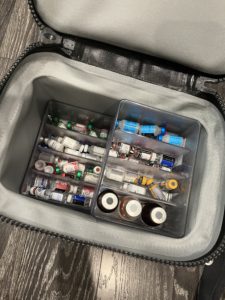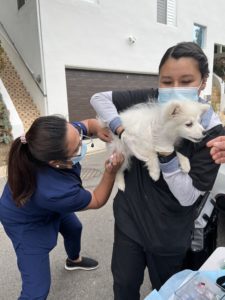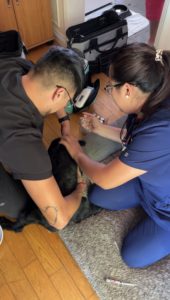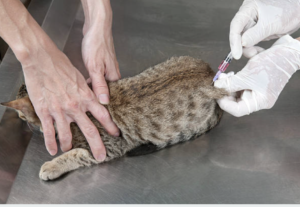Vaccines: Simplified!
By Camille Virtucio, DVM


Here is our team making sure that the puppy is distracted while getting vaccines!
Vaccines are part of the routine care and wellness of any pet. I notice most pet owners just randomly say yes to a vaccine plan recommended by veterinarians without fully comprehending what are they, what are they for, and for how long will the protection last. The goal of this article is to keep things simple for our dear pet parents.
In reality, there are so many types of vaccines out there. The most important thing is to know which are the core vaccines in your area and what are the common diseases in your region. That way, you are well equipped with information on what to say yes or no to when it comes to approving vaccination for your pet.
Prevention is always better than cure. Vaccines are cost effective than paying to treat a disease.
No vaccine (nor any drug, nor any treatment) can guarantee 100% protection, of course. Perfection doesn’t exist in any field, especially in veterinary medicine where there is a lot of reliance on your veterinarian’s skills, diagnostic tests and patient’s response to treatment. Pets cannot talk nor communicate with us directly. So yes, there is scientific guessing involved and that is what your veterinarian went to school for, so we can guide you in making decisions. These vaccines have gone through rigorous testing and has proven to offer protection. Pretty much the same as the COVID-19 vaccine – you may still get the disease; but with the general healthy population, the disease gets ‘diluted’ and the effects aren’t that bad when you get it. Same thing with pets.
Here are the common vaccines in DOGS:

- Rabies vaccine– can be 1 year or 3 year. Your vet will decide on how long the next vaccine will be. This will depend on your pet’s lifestyle and the date of the last rabies vaccine. In dogs, this is required by the law and is a core vaccine. Youshould get a rabies certificate signed a licensed veterinarian and a rabies tag with a unique number when your dog has received the vaccine.
- DHPP/DAPP cocktail vaccine for Distemper, Hepatitis/Adenovirus, Parainfluenza, Parvovirus. – Can be 1 year or 3 year. This is the second core vaccine in dogs wherever you go. In puppies, this is given in series and will be scheduled by your veterinarian depending on the age when the puppy has started in the vaccine. Full protection is not expected until you finish the series.
- Bordetella – lasts 6 months or 1 year. There are 3 versions – oral, injectable and intranasal. This protects from the Bordetella bronchiseptica bacteria which is one of the major players in Kennel Cough. It is NOT THE ONLY ONE causing kennel cough, ok? It is just one of them. Your dog can still get kennel cough that is not caused by Bordetella as Kennel Cough can be caused by multiple pathogens. This is a very common misconception about this vaccine. This is highly recommended for all pets – especially the ones boarding, playing with other pets, and travels with owners.
- Canine Flu Bivalent for subtypes H3N8 and H3N2 – To our Los Angeles pet parents, this is now a core vaccine highly recommended by the county since the outbreak last year 2021. THIS IS NOT THE SAME AS Bordetella and Parainfluenza, okay? But all of them are components of Kennel Cough syndrome. This vaccine needs to be boostered after 3 weeks when receiving the vaccine for the first time.
- Leptospirosis – Again, to our Los Angeles pet parents, this is now a core vaccine highly recommended by the county since outbreak last year 2021. This is not a virus as I often hear from clients – this is a bacterial disease that dogs gets from infected water from rat urine. This bacteria hits the liver and kidneys. This is treatable when diagnosed early, but can be fatal if detected late into the course of the disease.
Here is a link to other dog vaccines and a more in depth discussion of vaccines: https://www.aaha.org/aaha-guidelines/vaccination-canine-configuration/vaccination-recommendations-for-general-practice/
Here are the common vaccines for CATS:

- Rabies vaccine – same as dogs. This is highly recommended for cats. You should get a rabies certificate signed a licensed veterinarian and a rabies tag with a unique number when your cat has received the vaccine.
- FVRCP cocktail vaccine for Feline Viral Rhinotrachetis, Calicivirus and Panleukopenia – can be 1 year or 3 year. This protects your kitty from common respiratory, oral and gastrointestinal disease. This is given in series in kittens 3-4 weeks apart.
- Feline Leukemia Virus – this vaccine is notorious in the field as given ONLY to outdoor cats. However, this is now a core vaccine according to AAHA 2020 recommendations. I still recommend this to all my patients regardless of lifestyle. It is just recommended to test the cat for this virus through a quick blood draw before giving the vaccine. This is a 2 series booster, when given the first time. Otherwise, it’s a yearly vaccine.
Here is a link to other cat vaccines and a more in depth discussion of vaccines: https://www.aaha.org/aaha-guidelines/2020-aahaaafp-feline-vaccination-guidelines/core-vaccines-for-pet-cats/

Vaccine storage is important! Invest in a good quality and reliable cooler to maintain vaccine quality
When in doubt, always ask your veterinarian for recommendations as we are trained to assess your pet’s situation to see what vaccinations are recommended.
Remember that veterinary medicine is not black and white (and never will be), it is a product of the facts you provide, your decisions and your vet’s recommendations. It is a two way street. It is always a team effort.
That’s it for now. Hope this helped clear things up!

